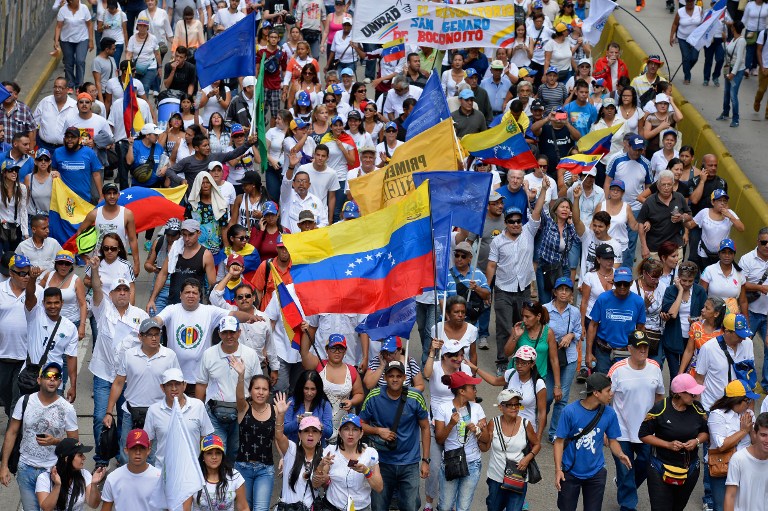
Venezuela’s opposition and government head into a crucial test of strength Thursday with massive marches for and against a referendum to recall President Nicolas Maduro that have raised fears of a violent confrontation. / AFP PHOTO / FEDERICO PARRA
CARACAS, Venezuela (AFP) – by Maria Isabel SANCHEZ
Hundreds of thousands of demonstrators crowded the streets of volatile Venezuela Thursday in a test of strength between its government and opponents seeking a referendum to remove President Nicolas Maduro.
Police deployed in their hundreds to keep apart anti-government protesters angry at food and medicine shortages from Maduro’s supporters who vowed to defend his “socialist revolution.”
Demonstrators dressed in white marched in the east of the capital, yelling “Venezuela is hungry” and “This government is going to fall.”
AFP reporters at the scene estimated their numbers in the hundreds of thousands. There was no official count.
Supporters of Maduro in red t-shirts and caps meanwhile rallied in the central Plaza Bolivar to shouts of “The people are with you.”
The rallies come at a highly volatile time for Venezuela, stricken by shortages, violent crime and outbreaks of looting in the once-rich major oil exporter.
“The march is a kind of thermometer for measuring the opposition’s capacity to mobilize,” said Diego Moya-Ocampos, an analyst at consultancy IHS.
“If it does not draw sufficient turnout that could help to demoralize the population,” he warned.
The opposition wants a referendum on removing Maduro from power. He has warned he will not tolerate a right-wing “coup.”
“We either come out to march or we will die of hunger. We are no longer afraid of the government,” said one demonstrator, Ana Gonzalez, 53.
At the pro-government rally, 37-year-old housewife Carolina Aponte said: “We are here at the call of our president, to defend the revolution.”
Jail threat
Maduro threatened to imprison opposition leaders if violence breaks out.
“Squeal, cry or scream, jail is where they’ll go,” he said.
The leader of the opposition Democratic Unity Roundtable (MUD), Jesus Torrealba, vowed marchers would defy the government’s “strategy of fear, blackmail and intimidation” with a peaceful march.
“Not one stone, not one hood, not one broken bottle,” he said. “What there will be is purely democratic citizens in the street.”
The authorities arrested three opposition leaders in the days ahead of the march.
Senior opposition figure Henrique Capriles said on Thursday that two mayors had also been arrested.
Referendum drive
The referendum’s timing lies at the heart of the battle.
If it takes place before January 10 and Maduro loses, new elections must be held. If he loses in a recall after that date, he would simply turn over power to his hand-picked vice president.
The polling firm Venebarometro says 64 percent of the electorate would vote against Maduro.
Maduro blames the crisis on the collapse of oil prices and an “economic war” by businesses backed by US “imperialism.”
He faces deep public discontent over shortages of basic goods and an inflation rate projected to hit 720 percent this year.
In 2014, the government crushed weeks-long anti-government protests in a confrontation that left 43 dead and prominent opposition leaders in prison.
Peace or provocation
Former presidential candidate Capriles estimated that a million people would heed the call to march.
“The government is afraid of the people’s peaceful action,” Capriles said.
“The aim of today is to show that we are organized, fighting for a solution that is peaceful, democratic, electoral and constitutional.”
He said Thursday that various buses of demonstrators had been stopped while heading to join the protest.
Ahead of the demo, top Maduro ally and former legislative speaker Diosdado Cabello, had warned the president’s side would crack down on protesters.
“Don’t provoke us,” he said.
“Not only are we going to block up Caracas so that no one can enter, but we will also make sure that no one can leave.”







